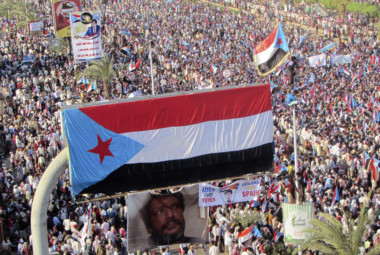
Aden: Southern separatists seeking to split from Yemen’s north have set an ultimatum for the government to evacuate its soldiers and civil servants by November 30 and asked all foreign firms producing oil and gas in the region to halt exports immediately.
Southern Herak, the main group demanding the restoration of a South Yemen state that merged with North Yemen in 1990, made its demands in a statement after it staged mass rallies in the southern cities of Aden and Mukalla on Tuesday.
“The state of the south is coming and no power can stop us from achieving this,” the statement said.
The statement coincides with a political crisis in the north that appears to have reinvigorated Herak’s demands for a separate southern state, a development that would be watched closely by a war-scarred region critical to world oil supplies.
Last month a northern-based rebel movement, Al Houthis, seized Yemen’s capital Sana’a, sidelining the weak administration of President Abd Rabbo Mansour Hadi.
Outmanoeuvre
Southern Herak appears to have drawn encouragement from Al Houthis’ ability to dictate terms to Hadi and to outmanoeuvre a military establishment weakened by divisions.
Yemen shares a long border with the world’s top oil exporter Saudi Arabia and flanks busy shipping lanes such as those in the strategic Bab Al Mandeb strait west of Aden.
Southern Herak asked all companies operating in oil and gas to halt their exports until technicians appointed by the southern movement can oversee the process and revenues are placed in banks under the name of a new southern state.
“The future relationship between the southern state and these companies will be determined by how committed they are to this,” the statement said.
Yemen is a small producer with proven oil reserves of around 3 billion barrels, according to the US Energy Information Administration (EIA). In March it estimated Yemen’s crude oil production at about 100,000 barrels per day.
Most of Yemen’s output is from the Marib-Jawf area in the north, with the rest coming from Masila in the southeast.
Yemen’s Al Dabbah oil export terminal is in Hadramout, south Yemen’s biggest oil and gas district, and the country’s Balhaf gas export terminal is in southern Shabwa province.
The Balhaf facility, heavily guarded by Yemeni troops, is run by France’s Total and ships liquefied natural gas (LNG) primarily to Asia and some European countries.
Total, the biggest foreign investor in Yemen, could not immediately be reached for comment.
Southern Herak, which was formed from a coalition of groups in 2007, set the November 30 deadline as a final date for “the evacuation of all military and security facilities and handing them over to the southern counterparts”.
Formerly Marxist South Yemen merged with the North in 1990.
Secessionists failed in a civil war in 1994 to reverse the unification.
Yemen has been gripped by renewed political turmoil since mass protests in 2011 forced its long-serving president, Ali Abdullah Saleh, to step down.
Al Houthis, who hail from Yemen’s northern highlands, have taken control of government ministries in Sana’a and struck a power-sharing deal with Hadi and other political forces.












